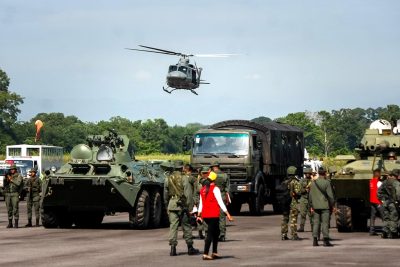Violence Escalates on the Border Between Venezuela and Colombia

All Global Research articles can be read in 51 languages by activating the “Translate Website” drop down menu on the top banner of our home page (Desktop version).
***
Once again, tensions are rising on the border between Venezuela and Colombia. Colombian paramilitary groups continue to use force to provoke, intimidate and encircle the Venezuelan government, serving the interests not only of Bogota, but of NATO – of which Colombia is an international partner.
On Thursday, two Venezuelan soldiers died after being hit by a landmine explosion during an operation near the border with Colombia. On the same occasion, nine Venezuelan combatants were injured and are being treated at a military hospital. The Venezuelan government has classified the case as a terrorist attack. Interestingly, the incident comes just after the Venezuelan Ministry of Defense announced the death and arrest of several Colombian paramilitaries in the border region, last Saturday.
These paramilitaries were members of irregular armed militias supported and financed both by the Colombian government and by its international partners (US and NATO) and since the beginning of the American crusade against the Maduro government, they have acted strongly on the border, carrying out attacks on soldiers of the Venezuelan armed forces and rehearsing a major invasion against the Bolivarian country. In response to Colombian provocations, the Maduro government launched the so-called “Operación Escudo Bolivariano 2021” (Operation Bolivarian Shield 2021), in March this year. According to official government data, the Operation has been successful in controlling the advance of the militias, but says it has difficulty mainly due to the ample aid received by these groups, which are financially and logistically supported by Bogota and Washington.
The Operation’s activities began on March 21 and have already killed 13 Colombians and four Venezuelans. Maduro says Bogotá has an interest in raising the confrontation to a conflict between the regular forces of both countries, which would be supported by the US Southern Command. Although these allegations are speculative, it is a statement that is consistent with the concrete data, considering the high degree of violence in the attacks by Colombian militias and the multifaceted military nature of Colombia.
It is necessary to understand that Colombia is a great military pluriverse, where regular and irregular armed forces coexist. Irregular forces are divided into paramilitary groups, guerrillas, criminal factions, drug cartels, mercenaries, political parties’ militias, among others. All of these organizations operate in parallel, controlling different regions and sometimes collaborating or fighting each other or the regular forces. With all this diversity of armed groups, the Colombian government does not immediately use its regular armed forces to serve its interests but calls the militias to carry out activities in an irregular manner, disguising the real intentions of the government.
These militias have ample firepower and receive abundant material aid, so that they manage to provoke their enemies strongly, however, they maintain an atmosphere of instability and uncertainties about the government’s plans, considering that it is not the regular armed forces that are in action. And this can be interpreted as a form of rehearsal for the future use of the armed forces. The mercenaries provoke Venezuela expecting responses at the same level of violence, so that Bogota then hardens the measures and can “justify” the use of its armed forces. Maduro, in denouncing this, demonstrates great strategic expertise and precisely for that reason the Venezuelan president has asked extreme caution to the forces of his country, so that they do not act with intensity beyond what is necessary and do not encourage a direct confrontation.
The fact that these tensions have been rising steadily in recent months shows that analysts who predicted a relief in anti-Venezuela policies (which were one of the marks of the Trump administration) with Biden’s election were wrong. The Democrat changed his speech in relation to the South American country and remains inert in the face of the unmeasured and unnecessary violence with which NATO-supported Colombian mercenaries have been working in the border areas, invading villages, and attacking Venezuelan military bases. Biden previously promised to try to negotiate a deal with Maduro so that new elections could be called in exchange for easing sanctions, however, after his election, the new president said he would not talk with Maduro in the short term, breaking his previous promise.
On American action in Colombia and support for irregular groups, Washington remains silent, when it should be held responsible internationally for stimulating conflicts and violating national sovereignty – which would be even more serious if investigations on the relations between groups supported by Bogota and Washington and the drug trafficking in South America were carried out, but it is something Washington tries to ignore in order to keep its accusation against Maduro of being a drug trafficker coherent.
Finally, as long as there is support from Washington and Bogota for mercenary groups, the violence will continue to escalate. Tensions are likely to reach an almost irreversible point in the near future, but it is too early to talk about a direct confrontation with regular forces.
*
Note to readers: please click the share buttons above or below. Forward this article to your email lists. Crosspost on your blog site, internet forums. etc.
This article was originally published on InfoBrics.
Lucas Leiroz is a research fellow in international law at the Federal University of Rio de Janeiro.
Featured image is from InfoBrics

